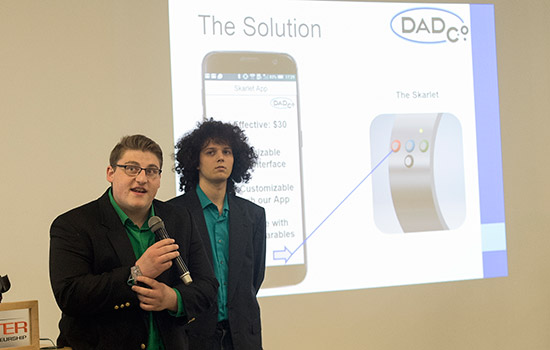Students pitch business ideas to investors
Saunders Summer Startup Program culminates with Investor Demo Night
A. Sue Weisler
RIT students Joseph DiPassio, left, and John Grosh demonstrate a prototype of their wearable technology that they hope will revolutionize the way consumers interact with their smart devices. The team, DADCo, was part of this year’s Saunders Summer Startup Program.
RIT student Rhyse Nier is hoping that his team’s business idea will one day enhance mobility functions while simultaneously improving the motivation of stroke patients undergoing therapy.
Nier’s start-up, GRETA, was among 11 student start-up companies represented at the culmination of the Saunders Summer Startup Program—Investor Demo Night, held Aug. 9 in Student Innovation Hall. Startups were comprised of multidisciplinary teams of students.
Harvesting ambient indoor lighting to supplement battery life, building an app that teaches Arabic to youngsters, and designing eco-friendly living memorials for cremated loved ones or pets were just a few of the uniquely innovative early-stage business ideas created by student teams during this year’s program.
Each summer, student teams are encouraged to jumpstart their ventures at the small-business launch pad in hopes of kick starting real companies. The program is sponsored by Saunders College of Business and the National Technical Institute for the Deaf, and hosted by the Albert J. Simone Center for Student Innovation and Entrepreneurship.
Throughout the summer, each of the startups was offered a stipend, a team expense fund, working space in Institute Hall and support from RIT faculty, assigned mentors and community business leaders.
Bernard Birnbaum, president of Jay Birnbaum Co. and co-owner of The Warrior Factory in Rochester, attended the wrap-up event and said that as a venture capitalist, he takes many factors into account when deciding whether or not to invest in a company.
“The first thing I look at is the management and the principles that I would be investing in,” he said. “It’s always important to have capable members to execute the product. Many start-ups begin with one idea and then pivot sometime in their cycle. Also, how does the product change the industry and make people think or act in a different way? I also look at the market and who are the other key players. What is the end game? And finally, it just comes down to the vibe I’m getting from the company as a whole.”
Nier, a third-year management and marketing dual major who minors in accounting and finance, said that their product “fills a gap at an unreal level,” and he and his team are grateful for the guidance they have received.
“The Saunders Summer Startup Program is intense,” said Nier, from Rochester, N.Y. “The mentors are insightful and aren’t afraid to dive right in when it comes to fixing problems that undoubtedly arise in all companies. They force us to get better, which is the part that I personally love.”
This summer’s student teams were:
- DADCo: creates inexpensive EMG-integrated consumer products based in wearable technology and bionic prostheses.
- GRETA: provides a wearable technology solution that allows patients to observe therapy progress, measure improvements, and provide motivation and better therapeutic compliance.
- VIGN: aggregates high-quality video content in sign language.
- Green Phoenix: provides eco-friendly living memorials for people who have had their loved ones or beloved pets cremated.
- HEDE Education: provides a set of interactive educational activities for children to learn sign language through apps. The product encourages both preverbal and early-language development through activities.
- Ripple: an online community where freelancers can collaborate on projects to obtain consistent incomes while keeping flexible work schedules.
- Pixture: provides a real-time photo streaming, facial recognition and event photo- sharing platform.
- Ambient PV: supplements battery life by harvesting ambient indoor lighting and eliminates the need to change batteries in Internet of Things (IoT) devices each year.
- Fanous Studios-Huruf: a suite of educational mobile games that teaches children formal Arabic.
- ChannelSuurf: an online community for sharing and discovering underappreciated online videos.
- HiBeams: intelligent headlights and taillights affixed to skateboards and longboards that adjust based on the riders’ motion.
Birnbaum left the event with a favorable impression.
“I was amazed at this program; I’m always a believer of real-life experience,” he added. “These students were able to take their ideas and create pitchable concepts around them. That is very impressive and speaks volumes to the development program and the mentoring they are receiving. Not all of these concepts will become viable companies, but the students received real-life experience that will guide them in their next venture.”




